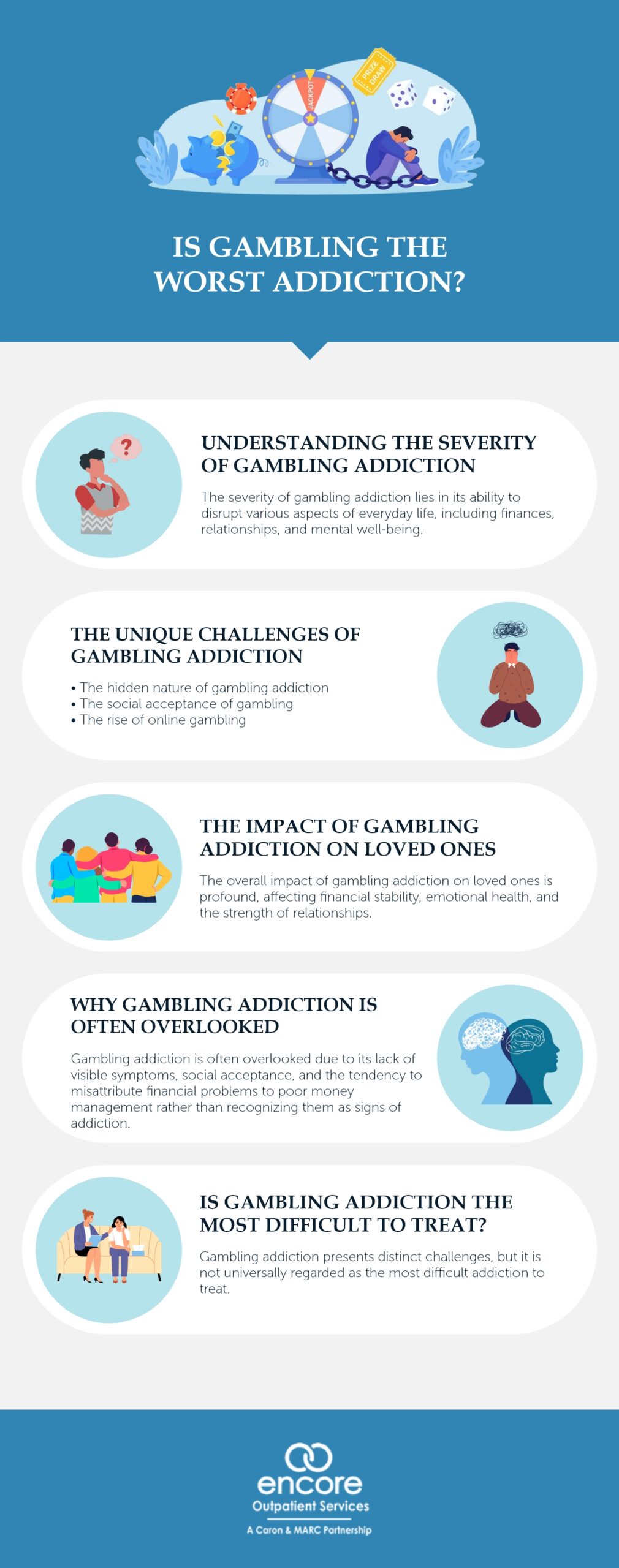While gambling addiction presents unique challenges and can have devastating effects on individuals’ lives, labeling it as the “worst” addiction is subjective. Each type of addiction has its own complexities and consequences that vary depending on individual circumstances. So, let’s explore the nuances of gambling addiction and see how it compares to other forms of addiction.
Understanding the Severity of Gambling Addiction
Gambling addiction, also known as gambling disorder, is recognized as a serious mental health condition with significant consequences for individuals and their families. The severity of gambling addiction lies in its ability to disrupt various aspects of everyday life, including finances, relationships, and mental well-being. Unlike substance use disorders, gambling addiction often remains hidden until the consequences become severe, making early detection and intervention challenging. The compulsive nature of gambling can lead to a cycle of increasing financial losses, emotional distress, and impaired decision-making, further complicating treatment efforts. Understanding the severity of gambling addiction is crucial in recognizing the need for timely and appropriate treatment.
Comparing Gambling Addiction with Substance Use Disorders
Gambling addiction and substance use disorders share important similarities, yet they also differ in key aspects.
Similarities:
- Addictive Behavior: Both gambling and substance use disorders involve compulsive behavior, where individuals continue their activities despite harmful consequences, such as financial issues, legal consequences, or health impact.
- Brain Reward System: Both conditions stimulate the brain’s reward system, leading to feelings of pleasure that reinforce the addictive behavior. This neurobiological similarity is central to the addictive nature of both disorders.
- Comorbidity: There is a high rate of comorbidity between gambling disorders and other mental health conditions, such as anxiety, depression, and substance use disorders. This overlap complicates both diagnosis and treatment.
- Treatment Approaches: Cognitive-behavioral therapy (CBT) is a common treatment method for both gambling disorders and substance use disorders. They both benefit from professional treatment and support groups like Gamblers Anonymous and Alcoholics Anonymous.
Differences:
- Nature of Addiction: Gambling disorder is primarily a behavioral and cognitive condition, whereas substance use disorders involve physical dependency on drugs or alcohol. This difference influences how each condition is diagnosed and treated.
- Health Consequences: Substance use disorders can lead to severe physical health problems, including overdose and death, whereas gambling addiction primarily results in financial losses and emotional distress without direct physical health risks.
- Withdrawal Management: Substance use disorder treatment often includes managing withdrawal symptoms due to physical dependence, which is not typically present in gambling addiction. However, people with gambling problems may face significant psychological challenges when attempting to quit.
- Diagnosis Criteria: The criteria for diagnosing these conditions differ. Substance use disorders are diagnosed based on patterns of use despite negative health consequences, while gambling addiction is assessed based on its impact on personal relationships and finances.
Understanding the similarities and differences between gambling addiction and substance use disorders is essential for developing effective, tailored treatment strategies for each type of addiction.

The Unique Challenges of Gambling Addiction
Gambling disorder presents unique challenges that differentiate it from other forms of addiction. Recognizing these challenges is essential for effective treatment and recovery.
- Impulse-Control Disorder: Gambling addiction is classified as an impulse-control disorder, where individuals struggle to resist the urge to gamble, even when they are aware of the potential negative outcomes. This loss of control can lead to significant financial and emotional distress, akin to the compulsions observed in substance use disorders.
- Increased Accessibility: The rise of online gambling has made it easier than ever to gamble, with opportunities available 24/7 through smartphones and computers. This constant accessibility makes it difficult for individuals in recovery to avoid triggers and temptations, increasing the risk of relapse. Research indicates that around 90% of individuals with gambling addiction experience relapse at some point in their recovery journey.
- Cognitive Distortions: Those struggling with gambling addiction often experience cognitive distortions, such as the belief that they can influence outcomes or that a win is imminent. These distorted thoughts can sustain the cycle of addiction, making it harder for individuals to recognize when their gambling has become problematic.
- Emotional Consequences: The emotional impact of gambling addiction can be severe, with individuals often experiencing guilt, shame, and hopelessness, particularly when faced with financial ruin or damaged relationships. These emotions can lead to increased isolation and withdrawal from social support, further complicating recovery.
- Social Acceptance of Gambling: Unlike substance use disorders, which are often stigmatized, gambling is frequently viewed as socially acceptable. This perception can make it harder for individuals to recognize their problems and seek help, as they may believe their gambling behavior is normal.
- Hidden Nature of the Addiction: Many individuals with gambling problems conceal their behavior from friends and family, leading to a lack of external support. This secrecy can intensify feelings of loneliness and shame, making recovery more challenging.
These challenges highlight the complexity of gambling addiction and emphasize the need for specialized treatment and support to address its unique aspects effectively.
The Impact of Gambling Addiction on Loved Ones
Gambling addiction extends its effects beyond the individual, significantly impacting loved ones. Families often face financial instability due to compulsive gambling behavior, as money may be lost, debts incurred, or assets depleted to fund the addiction. This financial strain can lead to stress, anxiety, and tension within the household, affecting relationships and overall family well-being.
Emotional turmoil is another significant consequence, as loved ones may experience feelings of betrayal, anger, and helplessness. The secrecy often associated with gambling addiction can erode trust, leading to communication breakdowns and strained relationships. Children, in particular, may feel confused and neglected as loved ones become increasingly preoccupied with gambling activities.
The stress of dealing with a loved one’s gambling addiction can also take a toll on the mental and physical health of family members. They may experience anxiety, depression or even develop their own unhealthy coping mechanisms in response to the ongoing stress. Additionally, the social stigma attached to gambling addiction can lead to isolation, as families may withdraw from social networks out of shame or fear of judgment.
The overall impact of gambling addiction on loved ones is profound, affecting financial stability, emotional health, and the strength of relationships. Addressing these effects is crucial in the recovery process, both for the individual struggling with addiction and for their family members.
Why Gambling Addiction Is Often Overlooked
Gambling addiction is frequently overlooked due to several factors, which can complicate its recognition and timely intervention.
- Lack of Visible Symptoms: Unlike substance use disorders, gambling addiction lacks obvious physical signs, making it easier for individuals to conceal their behavior. This invisibility allows the addiction to escalate without detection until significant financial consequences emerge.
- Social Acceptance of Gambling: Activities such as sports betting, lotteries, and casino games are commonly viewed as socially acceptable forms of entertainment. This widespread acceptance can blur the distinction between casual gambling and compulsive behavior, making it difficult for individuals to recognize when their gambling has become problematic.
- Attributing Financial Problems: Financial difficulties, a common consequence of gambling addiction, are often attributed to poor financial management or external factors rather than being recognized as a potential symptom of addiction. This misattribution can delay the identification and treatment of the underlying issue.
- Limited Public Awareness and Resources: Public awareness about gambling addiction is generally lower compared to substance use disorders. As a result, there are fewer educational resources and treatment options specifically targeting gambling addiction. This gap in awareness and resources can hinder early intervention and support.
The combination of hidden symptoms, societal norms, financial misattributions, and limited awareness makes gambling addiction particularly challenging to detect and address, often resulting in delayed intervention and support.
The Psychological Impact of Gambling Addiction
Gambling addiction has significant psychological effects that can deeply affect various aspects of an individual’s life.
- Mood Disorders: There is a high comorbidity between gambling addiction and mood disorders. Research indicates that up to 75% of pathological gamblers may experience unipolar depression, while approximately 30% may experience bipolar disorder. The stress and guilt associated with gambling can intensify these conditions, leading to feelings of hopelessness and despair.
- Anxiety Disorders: Many individuals with gambling addiction report elevated levels of anxiety. While gambling may initially provide a temporary escape from anxiety, it often leads to a vicious cycle where the compulsion to gamble intensifies as anxiety increases, especially when individuals attempt to recover their gambling losses. Research indicates that around 37.4% of individuals with pathological gambling also experience some form of anxiety disorder.
- Suicidal Ideation: Pathological gamblers are at a significantly higher risk for suicidal thoughts and behaviors compared to those with other addictions. Studies suggest that 17% to 24% of pathological gamblers may attempt suicide, often in response to severe financial losses.
- Substance Abuse: Individuals with gambling addiction may turn to alcohol or drugs as unhealthy coping mechanisms to manage the emotional distress caused by their gambling behavior. Studies have shown that 73% of pathological gamblers have an alcohol use disorder, 38% have a drug use disorder, and 60.4% are nicotine-dependent.
These psychological impacts highlight the severe mental health challenges associated with gambling addiction, underscoring the need for comprehensive treatment that addresses both the addiction and its related psychological issues.
Is Gambling Addiction the Most Difficult to Treat?
Gambling addiction presents distinct challenges, but it is not universally regarded as the most difficult addiction to treat. A key challenge is the lack of physical symptoms, making the addiction less visible and harder to detect. This invisibility often leads to delayed intervention, allowing the addiction to progress unchecked before treatment begins.
The social acceptance of gambling further complicates treatment. Unlike substance use disorders, where complete abstinence is often the goal, managing gambling addiction involves navigating exposure to an activity that is socially and culturally ingrained. This can make it challenging for individuals to avoid triggers and maintain long-term recovery.
The psychological aspects of gambling addiction, such as cognitive distortions and the emotional highs and lows tied to wins and losses, add another layer of complexity to treatment. Addressing these underlying psychological factors is essential but can be time-consuming and challenging.
However, with the right combination of therapy and support, individuals with gambling addiction can achieve long-term wellness. While it presents unique challenges, gambling addiction is treatable with appropriate, specialized care.
Long-term Wellness: What to Expect
Long-term wellness from gambling addiction is a continuous process that requires commitment, support, and ongoing effort. Individuals in recovery can expect to face various challenges, including managing triggers and avoiding situations that may tempt them to gamble. Building new, healthy habits and coping mechanisms is essential to maintaining recovery and preventing relapse.
Support from family, friends, and peer groups plays a crucial role in sustaining long-term wellness. Regular participation in support groups, such as Gamblers Anonymous, can provide valuable encouragement and accountability. Therapy, particularly cognitive-behavioral therapy and family therapy, may also continue to be a part of the recovery process to help individuals address any lingering psychological challenges.
It’s important to recognize that recovery is not a linear journey; setbacks may occur. However, these setbacks should not be seen as failures but as opportunities to learn and strengthen one’s commitment to recovery. With perseverance and the right support, individuals can achieve a fulfilling and balanced life free from the grip of gambling addiction.
If you or a loved one is struggling with gambling addiction, Encore Outpatient Services in Arlington, VA, offers specialized treatment designed to support long-term wellness. Our comprehensive programs combine evidence-based therapies with compassionate care to address the unique challenges of gambling addiction. Contact Encore Outpatient Services today to learn more about how we can help you take the first step toward a healthier, more fulfilling life.
